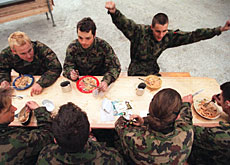
New cookbook has army on frontlines

The Swiss army has published a cookery book that offers a wide variety of recipes ranging from traditional Swiss dishes to more exotic food.
The cookbook was updated to adapt the food offered in the army to the modern eating habits of young soldiers.
The cookbook 60.6 d Kochrezepte, which has been in use since the beginning of this year, contains 190 recipes, 30 of which are new.
Reto Walther, the warrant officer and cooking instructor, said that there were several reasons for publishing a new cookbook, one being the restructuring of the army since the mid-1990s.
But he added that another more important reason was the change in eating habits of 20-year-olds in Switzerland over the last two decades.
“It’s not common in civilian life that you only eat traditional Swiss dishes. The people today like to have Chinese cuisine or Mexican, Indian, Italian or French,” Walther told swissinfo.
International cuisine
Walther and a few work colleagues were in charge of choosing and compiling the recipes.
He said that owing to the small age difference between him and the recruits, he was familiar with their preferences.
“Since I’m only 27 years old, I am a bit closer to our soldiers and recruits, than some other colleagues of mine who are at least 40,” he explained.
His team decided to replace some traditional but unpopular dishes containing liver, lung or heart by international favourites like Nasi Goreng and Mah Me. But there were certain recipes they could not do away with.
“We had to keep some of the very traditional military dishes, such as Pot au Feu, stew or fried cheese bread, because it would otherwise have turned into a political issue,” Walther said.
Walther maintained that the food in the Swiss army has always been healthy, but he was convinced that the new recipe book would help improve the quality of the food served.
“I am a bit choosy when it comes to food, so all the recipes in the book reflect my likings and preferences,” he added.
Long tradition
The history of the Swiss army cookery book goes back about 150 years and about seven or eight recipe books have been published since the beginning.
Walther said that it was important for the army to have a cookbook tailored to the needs of the military, because this made meal planning for cooks easier and allowed them to offer a varied and well-balanced diet.
The publication of the 2005 edition was initiated by René Schanz, the head of the project for food and nutrition, and was part of the latest army reform.
The project was carried out by a team including members of medical groups, hygiene inspectors, a veterinarian, a head nutritionist and people from the chef school in Thun, according to Walther.
He explained that the structure of the book had been simplified, containing an introduction dealing with regulations, hygiene and a recipe section.
Despite the fact that army cooks are experienced professional chefs, Walther considered it important to include the section about regulations and hygiene, because the rules in the army are stricter than in civilian life.
Walther said he was pleased with the new recipe book. He added that the troops and the instruction personnel in the army had given positive feedback and that even the public was interested in buying it.
“[Potential buyers] are enterprises or restaurants with a low budget or those that serve dishes to a large number of people, collectors who have all editions or professional chefs,” Walther said.
swissinfo, Katalin Fekete
Reglement 60.6 d Kochrezepte is the new recipe book for the Swiss army.
It has been in use since the beginning of this year and replaces Behelf 60.6 Kochrezepte, which was published in 1993.
The cookery book contains 190 recipes, 30 of which are new and international and replace more traditional ones.
The purpose of the book is to update army cooking to adapt to the eating habits of today’s recruits.

In compliance with the JTI standards
More: SWI swissinfo.ch certified by the Journalism Trust Initiative






























You can find an overview of ongoing debates with our journalists here . Please join us!
If you want to start a conversation about a topic raised in this article or want to report factual errors, email us at english@swissinfo.ch.